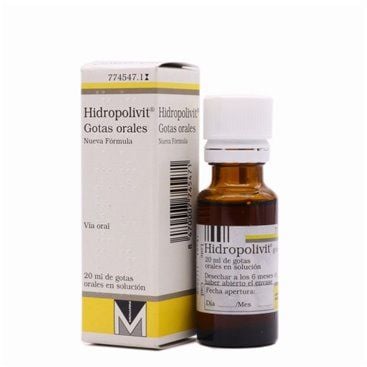Hydropolivit Drops 20Ml
It is indicated in: Vitamin deficiency states, such as in situations of inadequate diets, weight loss, vegetarian or others; lack of appetite and convalescence. Hidropolivit oral drops is indicated in adults and children over 2 years of age.
It is indicated in: Vitamin deficiency states, such as in situations of inadequate diets, weight loss, vegetarian or others; lack of appetite and convalescence. Hidropolivit oral drops is indicated in adults and children over 2 years of age.
Hidropolivit (Oral Drops In Solution 1 Bottle 20 Ml)
ACTION AND MECHANISM
Multivitamin (fat-soluble and water-soluble vitamins).
INDICATIONS
- Prophylaxis of [HYPOVITAMINOSIS], deficiency states of the vitamins it contains, especially in situations of: inadequate diets (weight loss diets, vegetarians or lack of appetite) and convalescence.
POSOLOGY
- Children up to 6 years old: 10 drops/day, which can be divided into 2 administrations.
- Children > 6 years and adults: 18 drops/day.
It is not recommended to take the drops continuously for more than 1 month.
RULES FOR CORRECT ADMINISTRATION
Administer during meals. The drops can be administered directly or dissolved in half a glass of water.
CONTRAINDICATIONS
- Hypersensitivity to any of the active ingredients.
- [LIVER FAILURE].
- Severe kidney failure.
- [BILIARY INSUFFICIENCY].
- Renal [OSTEODYSTROPHY] with [HYPERPHOSPHATEMIA].
- Calcium [BILIARY LITHIASIS].
- [HYPERCALCEMIA].
- [HYPERVITAMINOSIS D].
- Treatment with retinoids (contain retinol).
PRECAUTIONS
- [PEPTIC ULCER]. Caution due to the content of nicotinamide (nicotinic acid at high doses has a proulcerogenic effect). Monitor the possible reactivation of the ulcer.
- [GLAUCOMA]. Could be exacerbated by nicotinamide content.
- [RENAL INSUFFICIENCY], cardiac alteration, hyperphosphatemia, [DYSLIPEMIA], arteriosclerosis,
[SARCOIDOSIS] and other granulomatous diseases. For its vitamin D content (cholecalciferol).
- [HYPEROXALURIA] or [KIDNEY CALCULATIONS]. Ascorbic acid (vitamin C) can produce acidification of the urine, precipitation of urate, cystine or oxalate stones, or drugs, mainly with large doses and in individuals with kidney disease.
PRECAUTIONS RELATED TO EXCIPIENTS
- This medicine contains sorbitol. Patients with hereditary [FRUCTOSE INTOLERANCE] should not take this medicine.
ADVICE TO THE PATIENT
ADVICE TO THE PATIENT:
- It should not be used as a substitute for a balanced diet. Other vitamins should be taken into account.
- The urine may have a greater yellowish hue due to the presence of riboflavin (vitamin B2).
- It is not recommended to take continuously for more than 1 month.
INTERACTIONS
- Isotretinoin: the joint administration of isotretinoin and retinol increases the risk of hypervitaminosis A.
- Tetracyclines: the joint administration of tetracyclines and retinol can cause benign intracranial hypertension.
- Levodopa: Pyridoxine (vitamin B6) produces an increase in the peripheral decarboxylation of levodopa, which should be taken into account in levodopa-based antiparkinsonian treatments and in those that do not use inhibitors of L-amino acid-aromatic-decarboxylase . At recommended doses this interaction is very unlikely to occur.
- Digitalis: Vitamin D should be administered with caution in patients treated with digitalis glycosides since hypercalcaemia in these patients can cause cardiac arrhythmias.
- Antacids: The administration of antacids containing aluminum or magnesium together with vitamin D can increase the toxicity of aluminum and magnesium concentrations, especially in patients with chronic renal failure.
- Calcium: The administration of preparations containing calcium in high doses or thiazide diuretics together with vitamin D may increase the risk of hypercalcaemia.
- Enzyme inducers: Anticonvulsants of the hydantoin group, barbiturates or primidone, can reduce the effect of vitamin D.
- The administration of cholestyramine, colestipol, orlistat, liquid paraffin or mineral oil interfere with the absorption of fat-soluble vitamins A , D and E. That is why the shot will be spaced at least 2 or 3 hours apart.
ADVERSE REACTIONS RELATED TO EXCIPIENTS
- Because it contains methyl parahydroxybenzoate, it can cause [HYPERSENSITIVITY REACTIONS] (possibly delayed).




